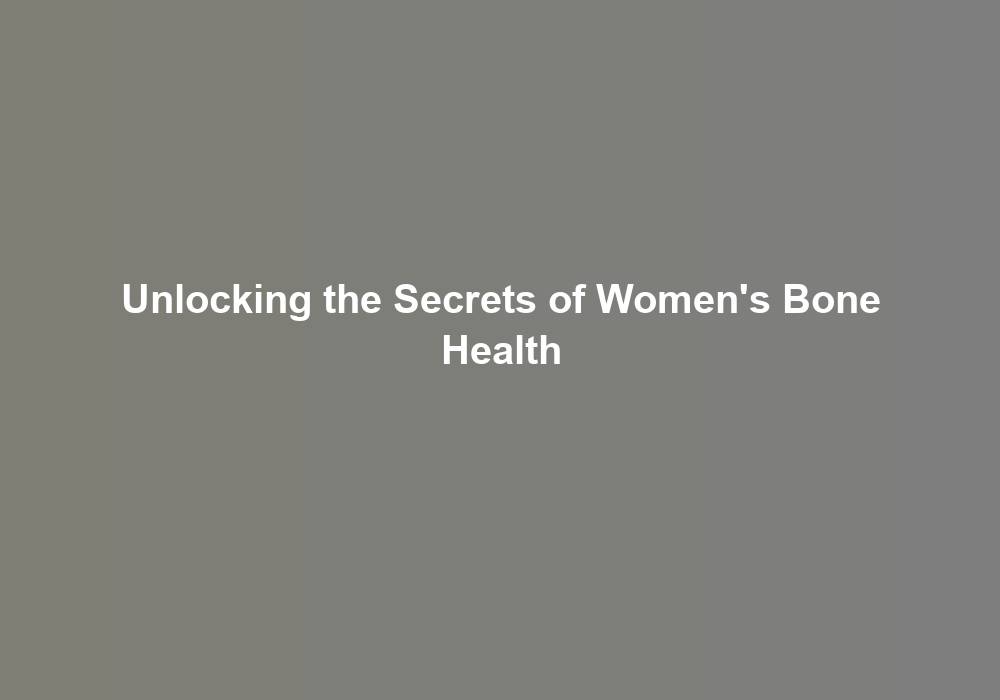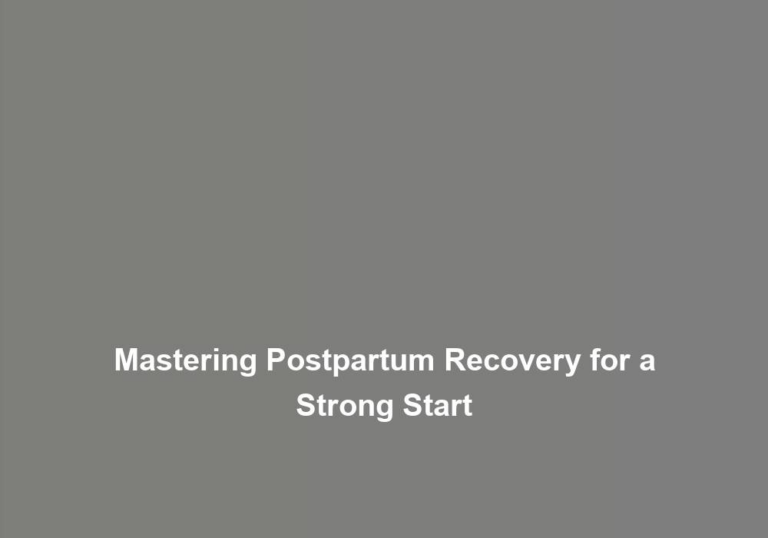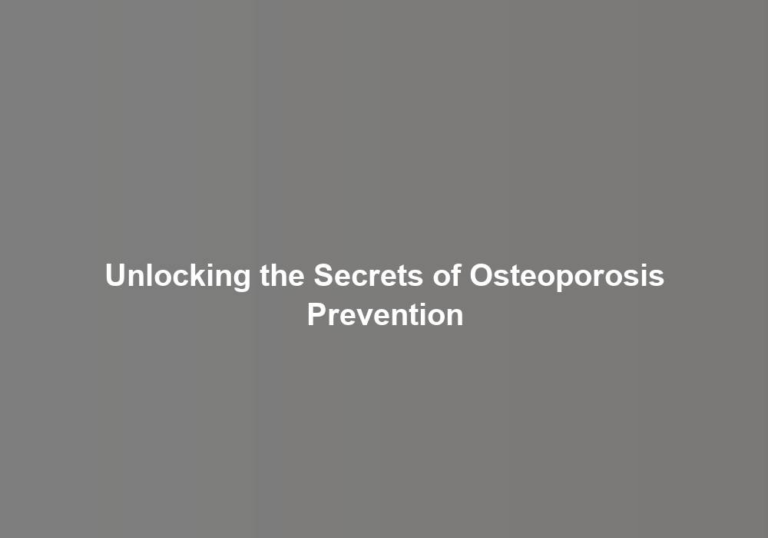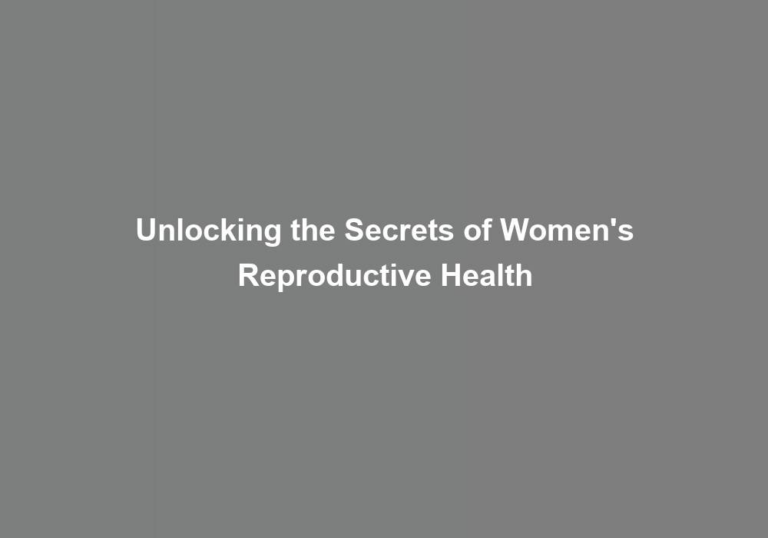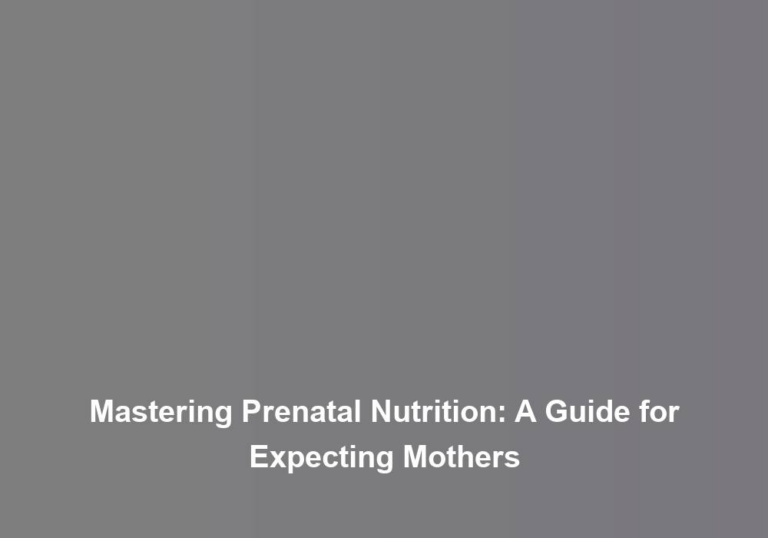Unlocking the Secrets of Women’s Bone Health
Do you know what factors could be impacting the health of your bones? ItG??s a question that many women may not consider until later in life. But the truth is, bone health is something that should be on your radar at every age. Understanding the secrets behind womenG??s bone health can not only help you prevent issues like osteoporosis, but also empower you to take proactive steps to support your overall well-being. Stay tuned to discover the latest research and recommendations that could make a real difference in your bone health.
Importance of WomenG??s Bone Health
Ensuring optimal bone health is crucial for women to maintain overall well-being, prevent fractures, and reduce the risk of osteoporosis. Two key components in achieving and maintaining strong bones are calcium intake and weight-bearing exercises. Calcium is essential for bone health as it is a major building-block of bone tissue. Women should aim for 1000-1200 mg of calcium per day, which can be obtained through dairy products, leafy greens, fortified foods, and supplements if necessary. It is important to note that vitamin D is crucial for calcium absorption, so ensure an adequate intake of vitamin D as well.
In addition to calcium intake, engaging in weight-bearing exercises is vital for building and maintaining strong bones. Weight-bearing exercises include activities where your body works against gravity, such as walking, jogging, dancing, and resistance training. These activities help stimulate bone-forming cells, leading to increased bone density and strength. For optimum bone health, it is recommended to engage in weight-bearing exercises for at least 30 minutes on most days of the week.
Research has shown that women who prioritize calcium intake and engage in regular weight-bearing exercises are better equipped to prevent bone loss and reduce the risk of fractures and osteoporosis. By incorporating these two key factors into your lifestyle, you can take proactive steps to ensure your bone health and overall well-being.
Factors Affecting Bone Density
Factors affecting bone density can be influenced by various lifestyle, genetic, and hormonal factors. Two key factors that play a significant role in bone density are dietary factors and exercise routines. Your bone health is impacted by the nutrients you consume and the physical activities you engage in.
| Dietary Factors | Exercise Routines |
|---|---|
| Calcium | Weight-bearing |
| Vitamin D | Resistance training |
| Protein | Flexibility exercises |
| Vitamin K | Balance exercises |
| Magnesium | Impact-focused exercises |
Consuming an adequate amount of calcium, vitamin D, protein, vitamin K, and magnesium is crucial for maintaining optimal bone density. These nutrients can be obtained from dairy products, leafy greens, fish, nuts, and seeds. Additionally, engaging in weight-bearing exercises, resistance training, flexibility exercises, balance exercises, and impact-focused exercises can help stimulate bone growth and prevent bone loss.
Research shows that individuals who follow a balanced diet and participate in regular physical activities tend to have higher bone density and a reduced risk of fractures. By incorporating these dietary factors and exercise routines into your daily life, you can take proactive steps to improve and maintain your bone health. Remember, making small but consistent changes to your lifestyle can have a significant impact on your bone density and overall well-being.
Risk Factors for Osteoporosis
What are the key risk factors for osteoporosis that you should be aware of to safeguard your bone health?
When it comes to osteoporosis, there are certain risk factors that can significantly impact your bone health. By understanding these risk factors, you can take proactive steps to protect your bones and reduce the likelihood of developing osteoporosis.
Key Risk Factors for Osteoporosis:
-
Lifestyle Habits
-
Dietary Choices: A diet low in calcium and vitamin D can weaken your bones over time. Additionally, excessive alcohol consumption and tobacco use can also contribute to bone loss.
-
Physical Activity: Leading a sedentary lifestyle or not engaging in weight-bearing exercises can increase the risk of developing osteoporosis.
-
Genetic Predisposition
-
Family History: If you have a family history of osteoporosis, especially if a parent or sibling has experienced fractures due to weak bones, you may be at a higher risk.
-
Ethnicity: Certain ethnic groups, such as individuals of Asian or Caucasian descent, are more prone to developing osteoporosis.
Understanding these risk factors can empower you to make informed decisions about your lifestyle and healthcare. By adopting bone-healthy habits and seeking medical advice if you have a family history of osteoporosis, you can take proactive steps to mitigate the risk of osteoporosis and safeguard your bone health for the future.
Latest Research and Recommendations
Considering the impact of risk factors on bone health, staying informed about the latest research and recommendations is essential for safeguarding your overall well-being. Research updates on womenG??s bone health have highlighted the importance of dietary supplements in maintaining optimal bone density. Studies suggest that calcium and vitamin D supplements play a crucial role in reducing the risk of osteoporosis, especially in postmenopausal women. It is recommended to ensure an adequate intake of these nutrients through a balanced diet and supplementation if necessary.
In addition to dietary supplements, recent research emphasizes the significance of exercise routines in promoting bone strength and overall health. Weight-bearing and resistance exercises have been shown to stimulate bone formation and enhance bone mineral density. Engaging in regular physical activity, such as walking, dancing, or strength training, can contribute to the prevention of osteoporosis and reduce the risk of fractures.
Preventive measures, based on the latest findings, also include maintaining a healthy body weight, avoiding smoking and excessive alcohol consumption, and minimizing the risk of falls through balance and strength training. These recommendations are crucial for women of all ages to prioritize their bone health and reduce the likelihood of developing osteoporosis in later stages of life. Stay updated on the latest research and recommendations to make informed decisions about your bone health and overall well-being.
Strategies for Maintaining Healthy Bones
To maintain healthy bones, incorporate weight-bearing and resistance exercises into your regular physical activity routine to stimulate bone formation and enhance bone mineral density. These exercises include activities such as walking, jogging, dancing, and strength training with weights or resistance bands. Additionally, focus on nutrition and ensure adequate intake of calcium, vitamin D, and other essential nutrients to support bone health.
Strategies for Maintaining Healthy Bones
- Nutrition and Exercise
- Consume a balanced diet rich in calcium and vitamin D to support bone strength and density. Incorporate dairy products, leafy greens, nuts, and fortified foods into your meals. Consider taking supplements if you have difficulty meeting these nutrient needs through diet alone.
- Engage in regular weight-bearing and resistance exercises to stimulate bone formation and improve bone mineral density. These activities help to strengthen bones and reduce the risk of osteoporosis, especially as hormonal changes and aging can affect bone health.
Conclusion
In conclusion, womenG??s bone health is crucial for overall well-being. Did you know that 1 in 2 women over the age of 50 will break a bone due to osteoporosis? ItG??s important to take proactive steps to maintain healthy bones, such as getting enough calcium and vitamin D, engaging in weight-bearing exercises, and talking to your doctor about your bone health. Stay informed and take action to protect your bones for a strong and healthy future.

